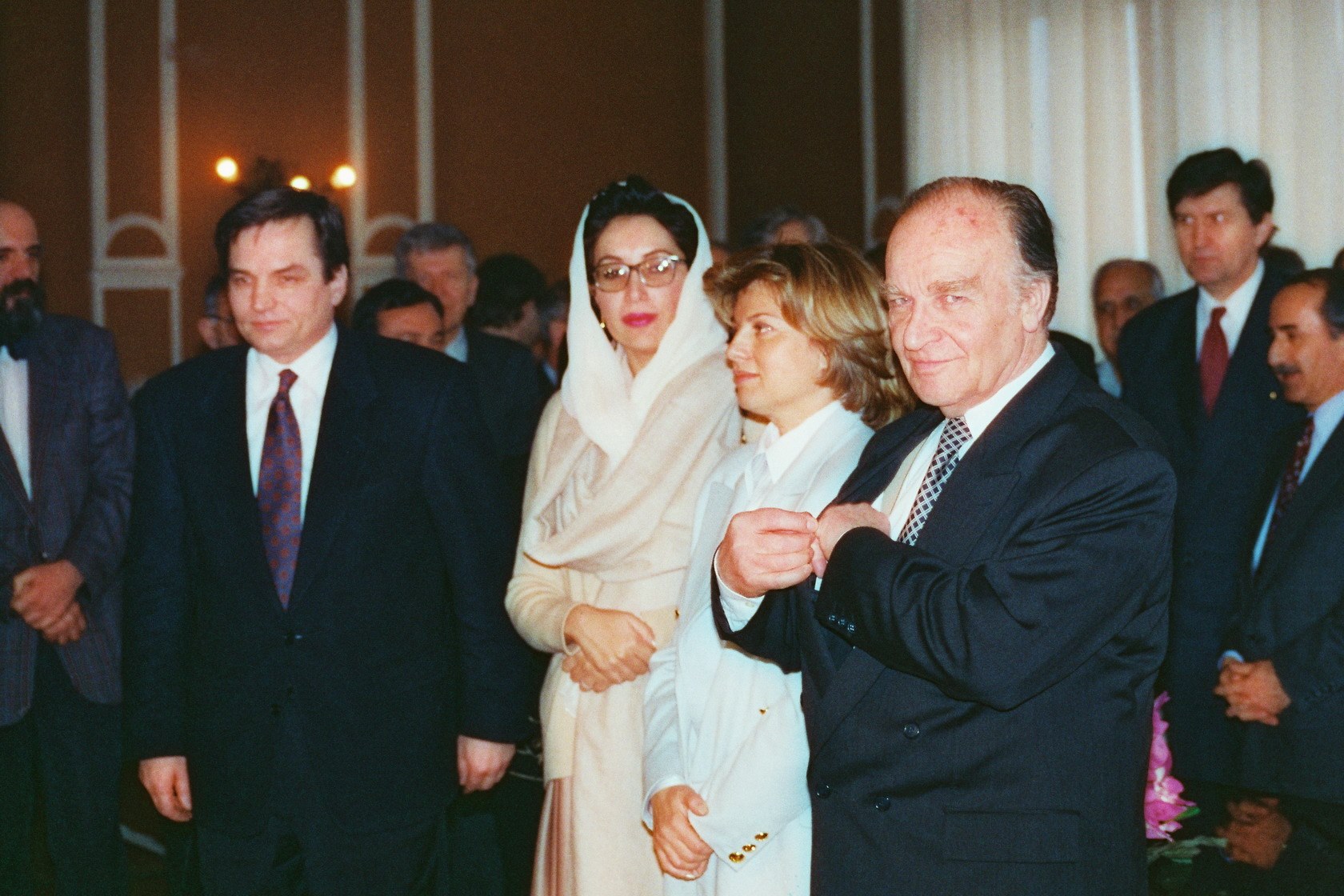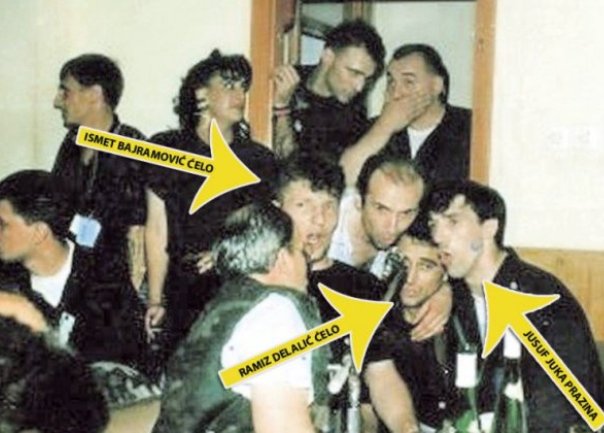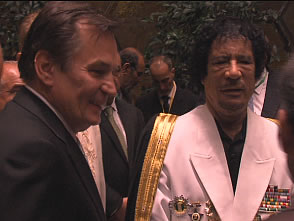Period:
Yugoslav Wars
Region:
Bosnia and Herzegovina
The Muslim criminal Haris Silajdžić- Bosnia 1992
Haris Silajdžić (1945) is a former Muslim politician who was a high-ranking official of the militant party SDA in the 1990s when wars were being fought in the former Yugoslavia.
He was also a member of the Muslim delegation to the Dayton peace talks in the fall of 1995.
Together with Alija Izetbegović and Ejup Ganić, he formed the infamous Muslim Head in the first half of the 1990s, when in three and a half years he was part of a joint criminal enterprise that caused at least 600,000 Serbs to be expelled from their homes in the Federation of BiH.

During the last decade of the 20th century, Haris Silajdžić was a member of the so-called War Presidency of Bosnia and Herzegovina, where, along with Izetbegović, many things were decided. In areas where Muslims had a relative or absolute majority, they were responsible for mass killings of Serbs, rapes of women, kidnapping of civilians, robberies, the bombing of houses and bars, demolition of Orthodox churches, persecution of SOC priests, or ethnic cleansing with genocidal intentions.
In reality, Silajdzić was the "alpha and omega" of Alija's regime. He was considered an individual who always fought “alone against everyone”.
BIOGRAPHY
Haris Silajdžić was born on October 1, 1945, in Breza (BiH), about 30 km north of the center of Sarajevo. This was a few months after the end of World War 2.
He grew up in a very religious family where his ancestors lived in the spirit of traditional Islam and Muslim fundamentalism.
Education and career
He finished primary school in his hometown, and later went to Sarajevo where he attended the Muslim religious school Gazi Husrev-beg's medersa. He graduated there in 1964.
He went to study in the mid-1960s in North Africa, in Libya, which was under the rule of Muammar al-Gaddafi. There he graduated in Arabic language and Islam in the University of Benghazi. He then returned to his homeland after five years.
He got a job in Priština at the Kosovo Institute of History and worked there until 1978. He earned a master's degree and defended his doctoral dissertation in 1979. He went to the United States for a short time in the early 1980s, then returned to Libya where he got a job as a professor.
Insiders say that Silajdzić worked as a translator in the service of the Yugoslav People's Army in Arab countries (where weapons were sold). In his homeland, in the late 1980s, he often appeared as a representative of the Islamic Community.

Ahoy, we got together.
He was elected a full professor at the Faculty of Philosophy in Sarajevo in 1996, and in 2002 he became a visiting professor at Cornell University in New York (USA).
Personal Life
He married three times. His first wife was the Albanian Ljuljeta Vunići from Priština (later she became an adviser to Hashim Thaçi, an Albanian criminal and leader of the so-called Republic of Kosovo). His second wife was Maja Zvonić from Mostar, with whom he had a son Mirza. And his third wife is Selma Muhedinović, a violin teacher and singer. He married her in 2016.
His son Mirza was educated in Turkey and later went to England to prestigious London universities. Harris had the money to pay for it.
Politics and social activism
Haris Silajdzić was never a member of the League of Yugoslav Communists. He served his regular military service in Belgrade as a member of Josip Broz Tito's personal guard. By the way, Silajdzić admired Broz and liked to imitate him.
It was only when Alija Izetbegović officially founded the Party of Democratic Action on May 26, 1990, that Haris Silajdžić quickly joined them. He became a close associate of Alija because he was very educated, but he also had his acquaintances both in the countries of the Arab world and in North America.
His motive for entering political waters was "the desire for change, the abolition of the one-party system and the establishment of a society of equal opportunities."
In the same year, he organized a large gathering of "Human Rights in Islam" in Sarajevo, where guests from most of the planet came.
When the first multi-party elections were held in November 1990, the chauvinist SDA party did well and received a large number of votes thanks to the successful businessman Fikret Abdić from Velika Kladuša, who was a lure to the voters. Then, the extreme wing of the SDA, to which Silajdzic himself belonged, rejected Abdić, and appointed Alija Izetbegović at the head of the government.
Haris Silajdzić immediately became the Minister of Foreign Affairs of the Government of Bosnia and Herzegovina, composed by Jure Prelivan from the Croatian Democratic Union party. The paradox is that BiH was not even close to independence from SFR Yugoslavia at that time. Silajdzić remained in that position even in the new so-called War Government.

Silajdzić (far left) in Dayton in 1995.
A peace agreement was signed in Washington on March 18, 1994, between Bosnian Croats and Muslims, after they had been in conflict for more than 16 months. It was decided that the Federation of Bosnia and Herzegovina would be formed and that the Government would be formed by Haris Silajdzić as Prime Minister. He remained in that position for a year and a half when he became a member of the BiH Council of Ministers.
Silajdžić was a member of the Muslim delegation to the American State of Ohio when the Dayton Peace Agreement was signed on November 21, 1995, which ended the armed conflicts in BiH. Ironically, only a year later, Silajdžić, being a signatory of that agreement, sharply criticized the same agreement and advocated for a change in the BiH Constitution. In his later pre-election speeches, the revision of Dayton will become a regular theme.
CRIMINAL ODYSSEY
At the beginning of 1992, the Muslim rulers connected with the Sarajevo underground, where figures from the bottom of human society paraded: Jusuf Juka Prazina, Musan Topalović Caco, Ramiz Delalić Ćelo, Ismet Bajramović and others.
They made an informal agreement under which criminals were allowed a free hand to do whatever they wanted without any sanctions: smuggling, blackmail, prostitution, robberies, murders, racketeering, etc. In return they would have to do dirty work for the government: intimidation and persecution of Serbs from Bosnia.

Dino Merlin with criminal friends
The extreme wing of the SDA, led mainly by Muslims from Stari Ras (so-called Sandžak), realized that the process of BiH's independence from Yugoslavia would not happen quickly and easily and that combat formations should be formed for such work. The decision was made in mid-1991 to establish the so-called.
The Patriotic League, and a little later the so-called Green Berets. This operation was entrusted to former Yugoslav officer Sefer Halilović, who deserted from the JNA (Federal Army) that year.
The Muslim Government of BiH decided on April 29, 1992, to attack the barracks and members of the JNA and to treat them as enemies, that is. occupiers. There is also an official note in the Ministry of Internal Affairs of BiH.
The Muslims united most of their paramilitary formations and the Territorial Defense into the so-called Army of Bosnia and Herzegovina, which had seven corps. They were helped throughout the war not only by NATO countries, primarily the United States, Great Britain, Canada, Germany, France, the Netherlands, Spain but also by the Islamic world: Afghanistan, Morocco, Saudi Arabia, Egypt, Turkey, Lebanon, etc.

The mujahideen came to the aid of the Balkans
Here are just some of the atrocities committed by Muslim (para)military and police formations during 1992-1995, some of which were committed in cooperation with the so-called Croatian Defense Council or the so-called Croatian Defense Forces.
- Bjelovac near Bratunac - December 14, 1992
- Ethnic cleansing in Visoko - from 1992 to 1995
- Ethnic cleansing in Goražde - from 1992 to 1995
- Donja Lijeska near Višegrad - October 29, 1992.
- Kazani Cave above Sarajevo - from 1992 to 1993
- Ledići near Trnovo - June 7, 1992
- Girls Nataša and Milica in Sarajevo - March 11, 1995.
- The Jovanović family in Zenica - October 2, 1993
- Attack on a JNA column in Tuzla - May 15, 1992
- Ethnic cleansing of Derventa - from April to July 1992.
- Ethnic cleansing of Pofalić - May 16, 1992.
- The village of Čemerno near Ilijaš - June 10, 1992.
- Driving on Ozren Mountain - September 10, 1995.
- Mirjana Dragićević from Donja Bioča – December 1992
Concentration camps
In addition to the killings of Serbs, the wartime presidency of BiH had a whole series of concentration camps in BiH around 536, according to the records of Sava Vidanović, of which 126 camps were only in the area of the city of Sarajevo. Not only JNA and later VRS soldiers were brought to these camps, as prisoners of war, but also Serb civilians who did not have weapons, nor was there any evidence that they were involved in any criminal acts.
They were imprisoned on the basis of false accusations that they were spies and betrayed JNA or VRS positions via radio; that they hated Muslims; that they had raped some Muslim women; and that they were members of the SDS party etc.
The conditions in those camps were more than terrible. Prisoners slept in unventilated rooms, on concrete, rarely with the use of toilets, without medical care, while beatings and psycho-physical torture were daily, just like the regular rape of girls and women. There were many cases of Serbs in Muslim camps being led to fake shootings, digging trenches on the front lines, frying with a burner (flamethrower), connected to an inductor telephone, cutting off their body parts, breaking bones, forcing them to eat feces and various other morbid acts which a healthy man cannot even imagine.
The cells were mostly small, no more than 20 square meters, and they typically held 40-50 prisoners.
The entire top military and civilian authorities in Sarajevo, including Haris Silajdžić, were very well informed about all these events in the camps, but nothing was done to stop it. Most of the camps were hidden and the International Red Cross delegation was not allowed to enter.
Violation of the Geneva Conventions
It is also interesting that the Muslim authorities concealed the use of banned ammunition or chemical weapons during the war which was produced in the "Behar" factory
Srebrenica region
Guided by the policy of genocide and extermination of everything that has to do with Serbs and Orthodoxy, the Muslim authorities paid special attention to eastern Bosnia, more precisely the Birač region: Skelani, Milići, Srebrenica, Batunac and Zvornik. Naser Orić was commander of the infamous 28th Division of the so-called Muslim Division, in that area, the so-called Army of BiH.
In three years, they ethnically cleansed about a hundred villages and hamlets in the area, while more than 3,800 Serbs, from children in cradles to the elderly of 95, have been killed or are missing.
AFTER THE WAR
He left the Party of Democratic Action in early 1996, although until then he was considered an important pillar of that political party. As he himself once said, the conflicts in the party began three years earlier in the midst of the Bosnian Herzegovinian war.
Although the real reasons for his departure from the SDA were not announced to the public, the common understanding is that Izetbegović was angry with him because there were a lot of mysterious disappearances of money from the International Donations Fund. All this was revealed by Ejup Ganić, who was secretly sent to the Maghreb countries and reported to Alija Izetbegović.
In April of the same year, he founded his party "Party for BiH", which he will lead until 2012. During that period, there will be more ups and downs, ie withdrawals and returns to the political life of BiH.
In January 1997, Silajdžić became co-president of the BiH Council of Ministers, along with Boro Bosić. He remained there until 2000 and maintained excellent relations with Turkey and other Islamist countries. In Libya, he enabled his colleagues from the business world to enter into very lucrative deals with Gaddafi, and he received a percentage for that.
He had several scandals, among which are mentioned: Tuzla’s bank, Zenica’s steel factory etc. Many sympathizers resented him because they could not reconcile that a tycoon from Kuwait was able to buy and manage the factory for so little money. Although his rating was falling, he mitigated it somehow by attacking politicians from the Republic of Serbia.
Harris came to the attention of the public in August 2007 when he caused a problem in the Presidency of BiH regarding the ratification of the agreement with the Serbian Orthodox Church. He had excuses because he wanted to prolong it indefinitely, that is, for the Serbian Orthodox Church not to be present in Bosnia and Herzegovina, because he wanted a religiously homogeneous community based on the model of Sunni Islam.

With Croatian Prime Minister Ivo Sanader (right) in 2009
In the spring of 2010, a regional meeting was organized in Sarajevo, where, in addition to Silajdžić, the following people came -Boris Tadić, President of the Republic of Serbia, Ivo Josipović, President of the Republic of Croatia and Filip Vujanović, President of Montenegro. The conclusion of the journalists after that was that Haris Silajdžić was a "lagging statesman".
In 2010, he presented to the state authorities of BiH the property status of two apartments in Sarajevo (one of 48 square meters and the other of 181 square meters). He also stated that he was driving an official Volkswagen Passat car. He did not report ownership of shares or "stocks" or luxury goods.
He wrote a collection of poetry "Sarječja", which he published in March 2015.
Dževad Galijašević, a member of the Expert Team for Terrorism and Organized Crime in Southeast Europe, has evidence that Haris Siladžić, together with Mustafa Cerić and Bakir Izetbegović, is covering up thousands of Wahhabis (radical Islamists) on the territory of the Federation of BiH. Their camps were near Bihać, Sanski Most, Brčko, Travnik and Zenica.
INDICTMENTS
In August 2008, former military court judge Marko Mikerević announced that he had evidence against Haris Silajdžić about Muslim war crimes against Serbs in Sarajevo. Mikerević claimed that Silajdžić knew about all this and that he participated in covering up and removing traces (for example, he paid for the cleaning of the soil from blood). These claims were also made by Jelena Kurtušić from Foča in Doboj, who worked as a cook for the so-called "Bristol" hotel and Army of BiH. In the gate of the Orthodox Church of the Transfiguration of the Lord, she saw severed heads standing on pillars.
In 2018, the Police Administration for the City of Trebinje submitted to the Prosecutor's Office of BiH evidence of Haris Silajdžić's involvement in war crimes and crimes against humanity during 1992-1995 against Serb civilians in the municipality of Konjic. The criminal report also states the responsibility for making a decision on the establishment of concentration camps: Čelebići, Musala and Bradina.

Silajdžić with Libyan leader Gaddafi in 2010
In addition, the Association "Croatia Linertas" filed a similar criminal complaint with the competent authorities ten years earlier, but without success.
The Bosnian-Herzegovinian judiciary has never indicted Silajdžić because of political pressure from the top. Harris told reporters that the reports were aimed at allegedly destabilizing BiH and changing borders in the Balkans.
Tags:
Please, vote for this article:
Visited: 6142 point
Number of votes: 10
|